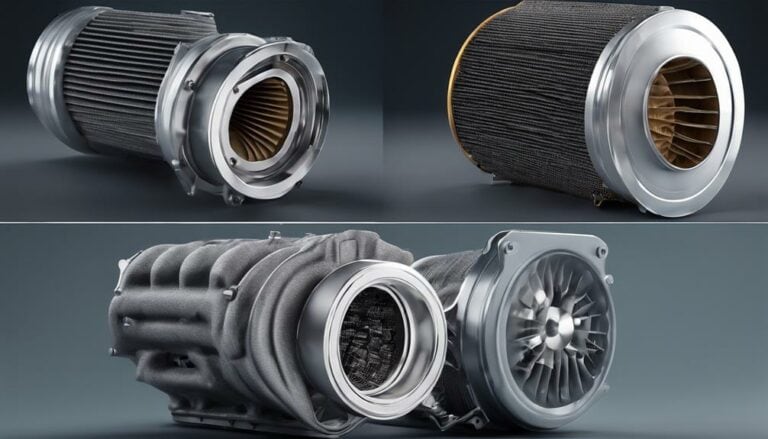If you've ever wondered whether aftermarket air filters could outperform stock ones, the answer might surprise you. Some aftermarket filters have shown promising results, hinting at the possibility of enhanced engine performance.
But before you decide which route to take for your vehicle, there are important factors to take into account. From horsepower gains to filtration efficiency, the discussion around aftermarket air filters is far from over.
Stay tuned to uncover the truth behind their potential benefits and drawbacks.
Key Takeaways
- Aftermarket filters can enhance engine performance with improved airflow and filtration efficiency.
- Stock filters excel in filtration but may lack performance enhancements.
- Choosing between aftermarket and stock filters involves balancing performance and filtration efficiency.
- Long-term cost savings and performance benefits can be achieved with proper maintenance of aftermarket filters.
Manufacturing Processes of Aftermarket Filters
When manufacturing aftermarket air filters, high-quality materials such as cotton gauze, foam, or synthetic fibers are commonly utilized to enhance filtration efficiency and airflow. These materials offer superior filtration capabilities compared to stock filters, allowing for increased airflow while effectively capturing harmful particles.
A critical aspect of aftermarket filter production is the pleating process, which involves folding the filter media to create more surface area for best filtration. By pleating the filter media, manufacturers can achieve higher filtration efficiency without compromising air flow, a delicate balance that's essential for engine performance.
Additionally, some aftermarket filters go beyond basic pleating techniques and incorporate special oil coatings. These oil coatings serve a dual purpose of enhancing filtration efficiency and airflow. The oil helps trap dirt particles more effectively without impeding air flow, resulting in improved engine performance and longevity.
Filtration Efficiency Comparison: Aftermarket Vs. Stock
In evaluating filtration efficiency, aftermarket air filters, such as K&N, display varying performance characteristics when compared to stock filters. When considering the filtration efficiency of aftermarket versus stock air filters, several factors come into play:
- Aftermarket filters like K&N may prioritize improved power gains over filtration efficiency.
- Stock filters are designed to excel in filtration efficiency but may not offer the same performance enhancements as aftermarket filters.
- The filtration capabilities of aftermarket filters, such as K&N, are often not as rigorously tested as stock filters.
- Choosing between aftermarket and stock filters involves balancing the desire for increased performance with the necessity of adequate filtration efficiency in the specific vehicle application.
Understanding the trade-offs between filtration efficiency and performance enhancements is important when deciding between aftermarket and stock air filters for your vehicle. It's essential to weigh the benefits of improved airflow and potential power gains against the necessity of optimal filtration to make an informed decision that aligns with your priorities.
Impact on Dirt Bike Performance
Aftermarket air filters for dirt bikes can greatly impact engine performance by enhancing airflow and filtration efficiency. These high-performance aftermarket filters allow more air to flow into the engine compared to stock filters, which can result in improved engine power and acceleration.
The increased airflow provided by aftermarket filters enables the engine to operate more efficiently, potentially leading to enhanced overall performance on the dirt bike. Additionally, some aftermarket filters are designed to be reusable, offering long-term cost savings for dirt bike owners.
It's essential to properly maintain aftermarket air filters to guarantee performance. By choosing the right aftermarket air filter for your dirt bike, you can't only experience better performance but also contribute to the longevity of your engine. Selecting an aftermarket filter that matches your bike's specifications and maintenance requirements is key to maximizing performance and enjoying a smoother ride.
Longevity and Maintenance Considerations
To guarantee peak engine performance and longevity, meticulous care and adherence to maintenance guidelines are imperative for performance air filters. When comparing aftermarket filters to stock air filters, consider the following maintenance considerations:
- Reusable Design: Aftermarket filters are often reusable and can be cleaned instead of being replaced, offering long-term cost savings.
- Best Performance: Proper maintenance of performance filters is essential for best engine performance and longevity.
- Cleaning Requirements: Regular air filters are disposable and require periodic replacement, while performance filters may only need cleaning.
- Lifespan Maximization: Understanding the cleaning and maintenance requirements of performance filters is essential for maximizing their lifespan.
Performance filters, when properly maintained, can offer better filtration and performance benefits over time compared to disposable stock filters. Before making a decision, consider the long-term maintenance needs of the filter to make sure it continues to perform at its best, as proven in dyno tests.
Cost Analysis: Aftermarket Vs. Stock Filters
Consider evaluating the cost-effectiveness of aftermarket air filters compared to stock filters based on their performance benefits. When conducting a cost analysis, it is important to weigh the price disparity against the potential horsepower gains to determine if the investment aligns with your desired engine enhancements. Aftermarket air filters can be up to four times pricier than stock filters, but this increased cost may not always translate to a proportional improvement in performance. To assist in your evaluation, refer to the table below showcasing the average percent improvement in performance for aftermarket filters compared to stock filters at varying price differentials:
| Price Differential | Average Percent Improvement |
|---|---|
| Low | 5% |
| Medium | 10% |
| High | 15% |
Conclusion
You've explored the world of aftermarket air filters and their performance advantages. By selecting the right filter, you can unleash the potential of your vehicle, like a well-oiled machine roaring to life.
Consider the manufacturing processes, filtration efficiency, impact on performance, longevity, maintenance, and cost. With the right aftermarket filter, you can experience a smoother ride, increased power, and acceleration that feels like a surge of adrenaline coursing through your engine.
Choose wisely and feel the difference.

